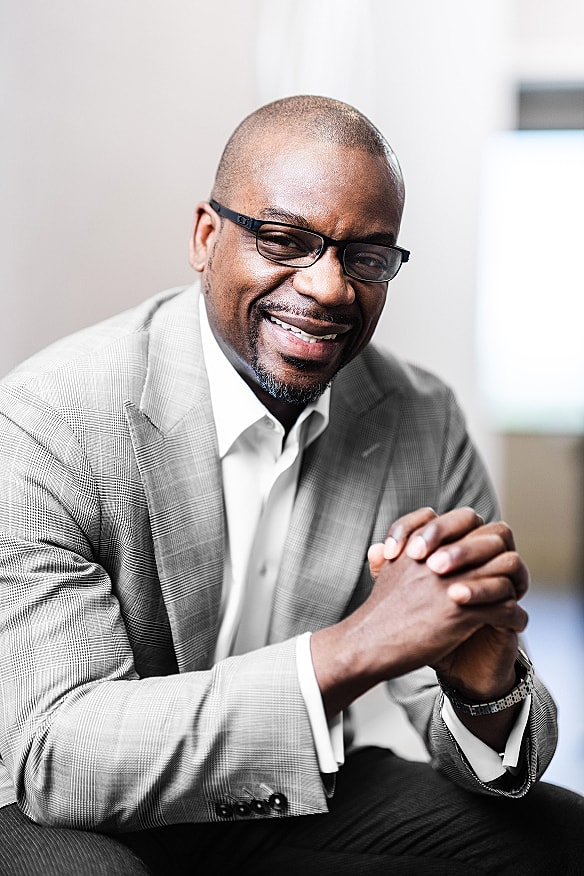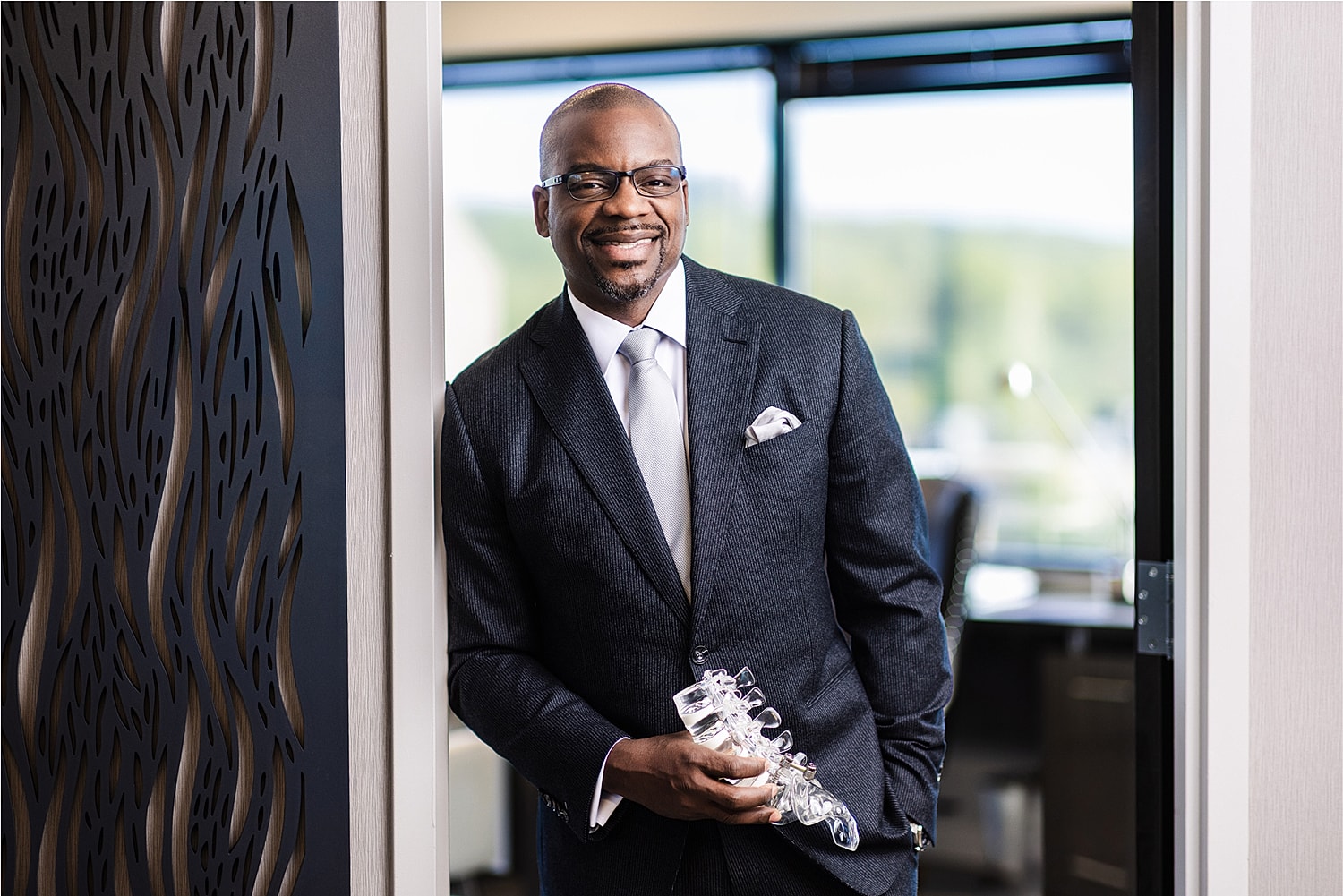
in New York & New Jersey
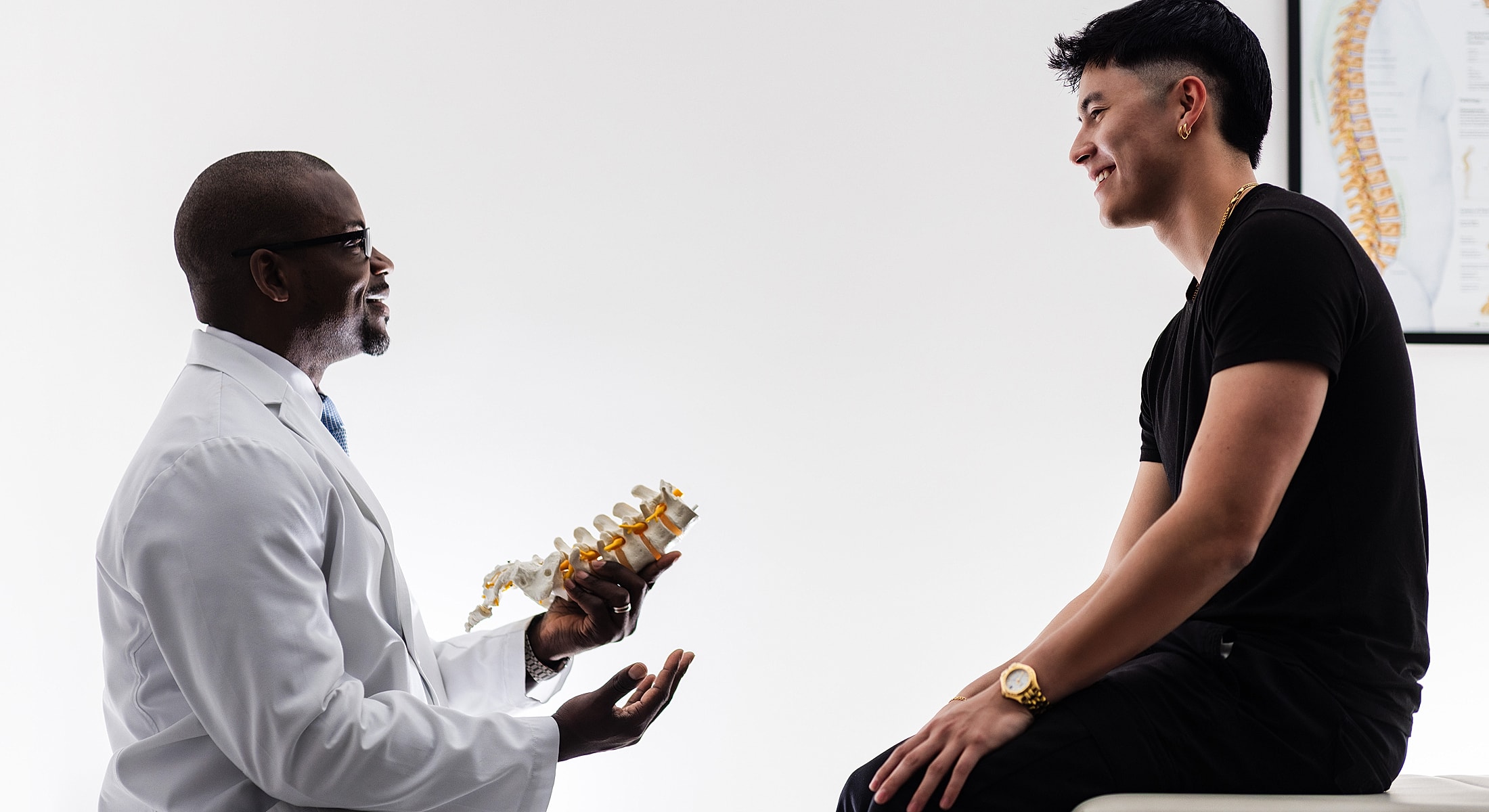

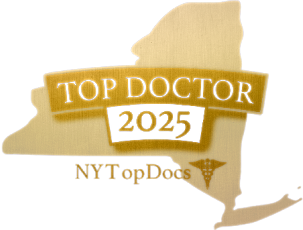

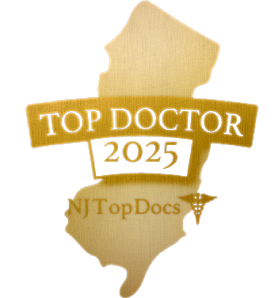

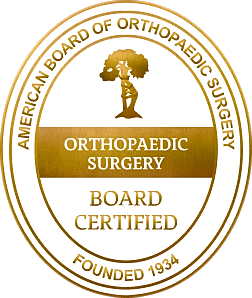

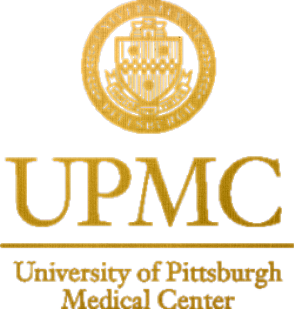








Back pain that comes and goes - or seems to get worse over time - may not just be a pulled muscle.
It could be degenerative disc disease (DDD), a condition where the discs that cushion your spine begin to break down with age, injury, or wear and tear. Over time, this can lead to stiffness, nerve pressure, and reduced mobility. We recognize the extreme effects that degenerative disc disease can impose on your daily life. Under the guidance of our esteemed spine surgeon, Dr. Gbolahan Okubadejo, MD, FAAOS, our devoted team is committed to delivering outstanding care and tailor-made degenerative disc treatment solutions. Our ultimate goal is to help you conquer this disease and reclaim your quality of life.
Degenerative disc disease isn’t actually a disease—it’s a condition that happens as spinal discs lose their ability to cushion the vertebrae.
These discs are soft, rubbery cushions that act as shock absorbers between the vertebrae, providing flexibility and allowing for smooth movement of the spine. However, with age and wear and tear, these discs can degenerate and undergo changes that lead to Degenerative Disc Disease. A “degenerating” disc may become thinner, drier, or develop small tears, which can irritate nearby nerves. DDD can affect any part of the spine, but is most common in:
It often starts gradually, with occasional stiffness or pain that worsens with movement or long periods of sitting. In more advanced cases, disc degeneration can lead to herniation, bone spurs, or nerve compression, which causes pain to radiate into the limbs.

At the Institute for Comprehensive Spine Care, we offer a wide range of treatment options to address Degenerative Disc Disease.
Our approach encompasses both non-surgical and surgical interventions, tailored to your unique situation. Dr. Okubadejo's specialized techniques and innovative procedures set him apart as a leader in the field, ensuring the highest level of care and successful outcomes for our patients.

These treatments focus on conservative and non-invasive approaches to alleviate pain and restore function.
Our success rates with non-surgical options are exceptional, allowing you to explore alternatives to surgery.
When surgical intervention is necessary, Dr. Okubadejo is a highly skilled and experienced spine surgeon who specializes in a range of surgical procedures
We prioritize patient safety and strive for optimal results, explaining the benefits, risks, and expected outcomes of each surgical option.
Degenerative Disc Disease is a condition that can fundamentally change how you move through the world. Our treatment protocols are designed to address the specific physical and lifestyle limitations caused by spinal wear and tear.
The primary goal of treatment is to silence the persistent aching in the neck (cervical) or lower back (lumbar). By stabilizing the spine and reducing inflammation at the disc level, we help patients move without the constant "reminder" of their condition.
As discs lose height, they can impinge on nearby nerves. Treatment addresses the shooting pain, "pins and needles" sensations, and numbness that often radiates into the arms or legs (sciatica), restoring normal sensation and comfort.
Degeneration often leads to a stiff, rigid spine. Through a combination of targeted therapies and, when necessary, motion-sparing surgical techniques, we address the mechanical restrictions that prevent you from bending, lifting, or staying active.
When nerves are compromised, the muscles they control can begin to weaken. Our treatments focus on decompressing those nerves and stabilizing the spinal segment to prevent further loss of strength and ensure your body feels reliable again.
You may be a candidate if:
During your consultation for degenerative disc disease treatment NYC & NJ spine surgeon, Dr. Okubadejo, will consider the full picture of your health, lifestyle, and goals before recommending treatment - starting with the most conservative approach that makes sense.

At the Institute for Comprehensive Spine Care, we believe that a successful outcome begins with a partnership. During your initial visit, Dr. Bo will perform a detailed physical examination and review your imaging (such as MRIs or X-rays). We take the time to explain the "why" behind your pain and discuss which treatment options—ranging from conservative care to innovative surgery—align with your lifestyle.
To get the most out of your consultation and subsequent treatment, we recommend the following:
Dr. Gbolahan Okubadejo is a leading spine surgeon in the NY/NJ area. As the head of The Institute for Comprehensive Spine Care, he prioritizes patient-centered care and is dedicated to excellence. In addition to his clinical practice, Dr. Okubadejo is involved in research and has received numerous awards. He champions preventive care and minimally invasive procedures. He believes in educating patients and including them in their treatment plans.
Our commitment to patient satisfaction and positive outcomes is evident in our past patient testimonials and their improved quality of life.
★★★★★
Recovery is a critical phase in your journey to a pain-free life. Dr. Okubadejo and our dedicated team understand the importance of post-operative care and rehabilitation.
We develop personalized recovery plans that include physical therapy, rehabilitation exercises, and pain management strategies to optimize your healing process. With our support, you can achieve long-term success and regain your active lifestyle.
Because no two spines are identical, the investment for your treatment is unique. We provide highly personalized care, which means the total cost of your treatment is determined by the specific techniques and resources required to achieve your best possible outcome. Factors that influence this include the complexity of the procedure—such as whether you require a minimally invasive microdiscectomy, a spinal fusion, or an artificial disc replacement—as well as the use of state-of-the-art implants or robotic-assisted surgical technology. In some instances, Dr. Bo may also perform combination procedures to address multiple levels of the spine or secondary conditions like spinal stenosis in a single session, which will affect the final estimate.
Our team is dedicated to helping you navigate the insurance process; we accept most major plans, including PPOs, HMOs, and Medicare, and we will work closely with you to ensure that insurance coverage is never a barrier to the high-quality spine care you deserve.


With multiple locations in NY and NJ, the Institute for Comprehensive Spine Care is dedicated to providing comprehensive solutions for individuals suffering from Degenerative Disc Disease.
Our team of experts is committed to evaluating each patient’s unique situation and tailoring the most effective treatment approach, whether it involves surgical interventions, such as spinal fusion or discectomy, or conservative therapies. We recognize the crucial role of accurate diagnosis in developing an effective treatment plan. That’s why we utilize state-of-the-art diagnostic technologies to precisely identify the nature and extent of Degenerative Disc Disease. By combining these advanced tools with our extensive expertise, we can develop a personalized care plan that aligns with your specific needs and goals.
Don’t allow Degenerative Disc Disease to limit your daily activities or cause unnecessary pain any longer. Take the first step towards relief by scheduling a consultation with us today. Trust in our expertise and compassionate approach as we strive to alleviate your symptoms and restore your well-being to its fullest potential. We are here to support you on your journey towards a pain-free life.
The exact cause is often related to natural wear and tear on the discs over time. Factors such as aging, genetics, repetitive stress, and certain lifestyle habits can contribute to the development and progression of Degenerative Disc Disease.
Symptoms can vary, but common signs of Degenerative Disc Disease include chronic back or neck pain, stiffness, limited range of motion, numbness or tingling in the extremities, and muscle weakness.
Yes, many cases of Degenerative Disc Disease can be effectively managed with non-surgical treatments. These may include physical therapy, medications, chiropractic care, injections, lifestyle modifications, and other conservative approaches aimed at reducing pain, improving function, and enhancing quality of life.
While treatment can provide significant relief, Degenerative Disc Disease is a chronic condition, and there is a possibility of symptoms returning over time. However, with proper care, lifestyle modifications, and ongoing management, the recurrence of symptoms can often be minimized or managed effectively.
While Degenerative Disc Disease cannot be entirely prevented, certain measures can help manage the condition and reduce the risk of further deterioration. These include maintaining a healthy weight, adopting proper posture and body mechanics, engaging in regular exercise, avoiding smoking, and following a nutritious diet.
Surgery is typically considered when conservative treatments have not provided sufficient relief or when there are severe neurological symptoms, such as persistent weakness or loss of bladder/bowel control. Surgical options may include discectomy, spinal fusion, or artificial disc replacement, depending on the individual case.


